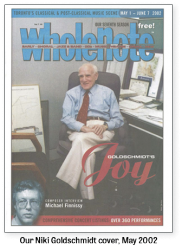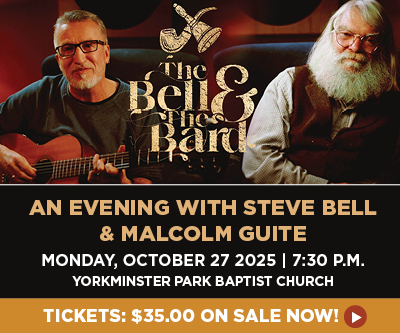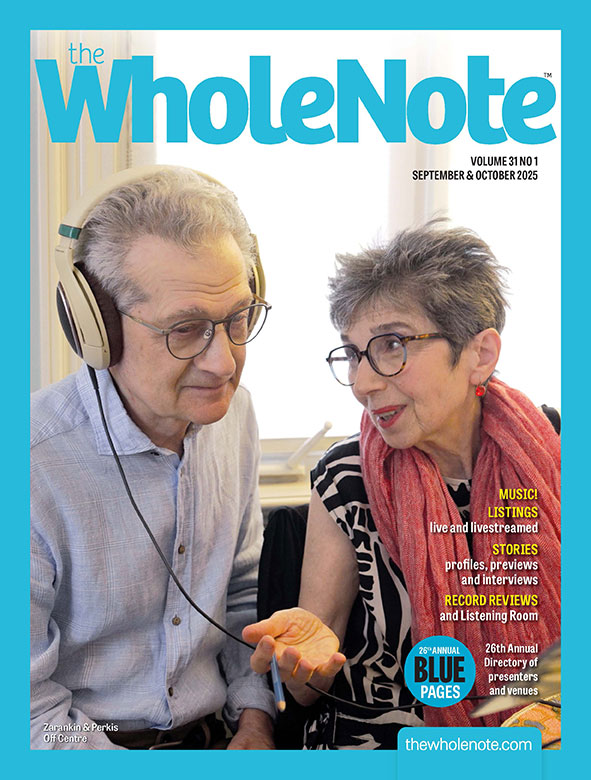Intersection 1: Esprit and the Iselers.
 There’s a slight pause at the other end of the line and then, “Put it this way, I could not have written this earlier,” he says. The speaker is composer Alex Pauk, founding artistic director and conductor of the Esprit Orchestra. The “this” he is referring to is his Soul and Psyche, a 30-minute, five-movement “devotional” work for choir and orchestra that will be performed March 31 at Koerner Hall, by the combined forces of Esprit and the Elmer Iseler Singers, under Pauk’s baton. It will be the final work in the final concert of Esprit’s 33rd season. For the Iselers, in this, their 37th year, there are two concerts to go after this. But this is one that they are approaching with a particular gusto. “We do all kinds of music,” Iseler conductor Lydia Adams says. “But this choir absolutely relishes the opportunity to take on a new work. They are completely dedicated to their craft, absolutely open to whatever a new work brings.”
There’s a slight pause at the other end of the line and then, “Put it this way, I could not have written this earlier,” he says. The speaker is composer Alex Pauk, founding artistic director and conductor of the Esprit Orchestra. The “this” he is referring to is his Soul and Psyche, a 30-minute, five-movement “devotional” work for choir and orchestra that will be performed March 31 at Koerner Hall, by the combined forces of Esprit and the Elmer Iseler Singers, under Pauk’s baton. It will be the final work in the final concert of Esprit’s 33rd season. For the Iselers, in this, their 37th year, there are two concerts to go after this. But this is one that they are approaching with a particular gusto. “We do all kinds of music,” Iseler conductor Lydia Adams says. “But this choir absolutely relishes the opportunity to take on a new work. They are completely dedicated to their craft, absolutely open to whatever a new work brings.”
And new this work certainly will be! With a month to go, the proverbial ink is not yet dry on the fifth movement, and Pauk confesses on the phone to tinkering with the text of the first movement, which is based on “Taoist writings on the life force of the universe,” sneaking in a topical reference to gravitational waves. Pauk agrees with Adams’ assessment of the Iselers’ readiness, referencing their “full virtuosic capabilities” and comparing their spirited open-mindedness to that of his own orchestra. “Ready to give it the full go” is how he describes it; “always singing the music not the notes.”
As to what to call the work, genre-wise, Pauk is understandably reluctant to be too categorical. At one point in the literature about the piece, it’s referred to as “contemporary mass in five movements.” At another, it’s referred to as “spiritual and uplifting in nature without being strictly religious,” a description borne out by the inclusion of texts ranging from Inuit poetry to ancient Chinese poetry, a fragment from Goethe’s Faust, a Balinese prayer for departing souls, Biblical passages and the composer’s own words.
Had Pauk written the piece when the idea was first presented to him, he tells me, it would have been a mass by name and nature. “It was Niki Goldschmidt who suggested I write a mass,” he says “right after the very first Toronto International Choral Festival in 1989” (a festival that included repertoire as diverse as The Death of a Buddha by R. Murray Schafer, commissioned by the BBC for the BBC Singers, Songs of Creation by Srul Irving Glick, commissioned for the Toronto Mendelssohn Choir, and a performance of Verdi’s Requiem at Roy Thomson Hall.) But it didn’t happen at that time, or at any time since (although Pauk and Jessie Iseler talked about it often enough over the years, he says, at the level of “we really should do that mass we keep talking about.”)
Simply put, it was something that Pauk had to be ready to do. “Ready technically, ... musically, ... spiritually?” I ask. And then comes that pause on the line. “Put it this way,” he says. “I could not have written this earlier.”
I am looking forward to this particular concert, not just for the premiere of Pauk’s piece, but for the pleasure of watching these two pioneering musical organizations intersect and interact.
Intersection 2: Winter’s Summer
This is the time in the year when thoughts of summer are either a scourge or a solace: scourge, if all they bring are pangs of longing for the unattainable; solace, if used as an opportunity to put plans in place for what to do during that other season that seems, amid the slush, unattainably far away. You will find our annual summer music education resource guide tucked away on pages 54 to 59. It is, as usual, an extraordinarily suggestive compilation of 32 summer music educational opportunity, for all ages and levels and ability. It makes no grand claims to comprehensiveness (although, as in previous years, it will likely continue to grow online at thewholenote.com/resources, as the summer draws nearer.) So seize the day! Take action now to make 2016 a musical summer worth spending the winter looking forward to.
It’s a Watershed Moment – Ask LUDWIG!
 LUDWIG, for the uninitiated, is an acronym for Listings Utility Database for WholeNote Information Gathering. It was Colin Eatock, during his time here as Managing Editor/Listings Coordinator who coined the phrase to describe our painstaking multi-year project to reinvent the way we gather and repurpose the live musical listings that are the backbone of what we are and what we do. Much of the work that has gone into LUDWIG to this point has been invisible to readers, revolving around the way we process listings, rather than how we supply them to you. Simply put, we used to word-process everything; now our listings gathering is based on data entry. It’s been a challenge and a big change; but over time, LUDWIG has made the task of listings generation a lot easier.
LUDWIG, for the uninitiated, is an acronym for Listings Utility Database for WholeNote Information Gathering. It was Colin Eatock, during his time here as Managing Editor/Listings Coordinator who coined the phrase to describe our painstaking multi-year project to reinvent the way we gather and repurpose the live musical listings that are the backbone of what we are and what we do. Much of the work that has gone into LUDWIG to this point has been invisible to readers, revolving around the way we process listings, rather than how we supply them to you. Simply put, we used to word-process everything; now our listings gathering is based on data entry. It’s been a challenge and a big change; but over time, LUDWIG has made the task of listings generation a lot easier.
But you have still had no easy way of hunting down the particular listings you’re interested in, short of searching through the listings day by day; no way easily to search the listings by keyword, by artist or presenter, by genre, by date or date range, by geographic zone ... .
BIG NEWS is that very soon you will! In fact, you already can, if you are willing to help us! You can participate in public testing of Ask LUDWIG by going to thewholenote.com. Find the listings tab, then scroll down to Ask LUDWIG and click.
Watershed moment? You tell us what, for you, would make it so.
publisher@thewholenote.com




